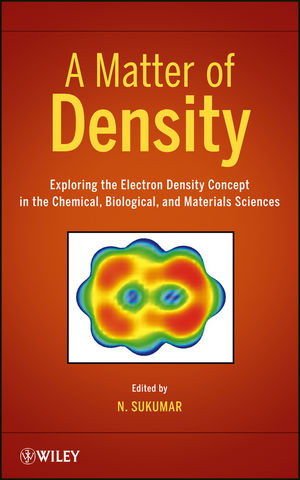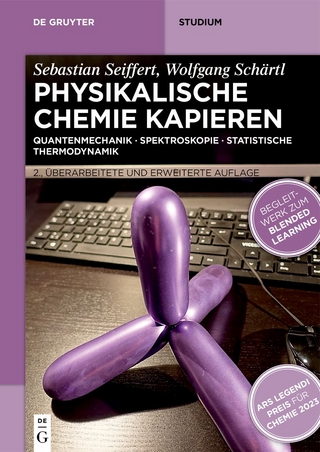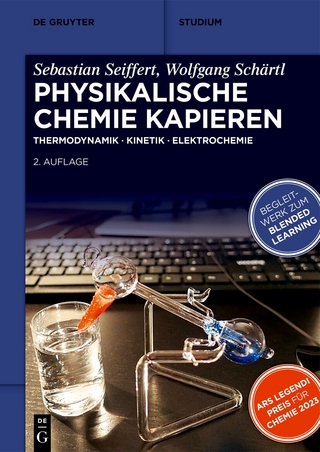
A Matter of Density
John Wiley & Sons Inc (Verlag)
978-0-470-76900-3 (ISBN)
- Titel z.Zt. nicht lieferbar
- Versandkostenfrei innerhalb Deutschlands
- Auch auf Rechnung
- Verfügbarkeit in der Filiale vor Ort prüfen
- Artikel merken
The origins and significance of electron density in the chemical, biological, and materials sciences
Electron density is one of the fundamental concepts underlying modern chemistry and one of the key determinants of molecular structure and stability. It is also the basic variable of density functional theory, which has made possible, in recent years, the application of the mathematical theory of quantum physics to chemical and biological systems.
With an equal emphasis on computational and philosophical questions, A Matter of Density: Exploring the Electron Density Concept in the Chemical, Biological, and Materials Sciences addresses the foundations, analysis, and applications of this pivotal chemical concept. The first part of the book presents a coherent and logically connected treatment of the theoretical foundations of the electron density concept. Discussion includes the use of probabilities in statistical physics; the origins of quantum mechanics; the philosophical questions at the heart of quantum theory, like quantum entanglement; and methods for the experimental determination of electron density distributions.
The remainder of the book deals with applications of the electron density concept in the chemical, biological, and materials sciences. Contributors offer insights on how a deep understanding of the origins of chemical reactivity can be gleaned from the concepts of density functional theory. Also discussed are the applications of electron density in molecular similarity analysis and electron density-derived molecular descriptors, such as electrostatic potentials and local ionization energies. This section concludes with some applications of modern density functional theory to surfaces and interfaces.
An essential reference for students as well as quantum and computational chemists, physical chemists, and physicists, this book offers an unparalleled look at the development of the concept of electron density from its inception to its role in density functional theory, which led to the 1998 Nobel Prize in Chemistry.
N. SUKUMAR, PhD, is Professor, Head of the Department of Chemistry and Director of the Center for Informatics at Shiv Nadar University, India. He is also associated with the Rennselaer Exploratory Center for Cheminformatics Research at Rennselaer Polytechnic Institute. He has lectured at conferences throughout the world and authored numerous review articles, research papers, and book chapters.
Preface vii Contributors ix
1 Introduction of Probability Concepts in Physics—The Path to Statistical Mechanics 1
N. Sukumar
2 Does God Play Dice? 15
N. Sukumar
3 The Electron Density 41
N. Sukumar and Sunanda Sukumar
4 Atoms in Molecules 67
N. Sukumar
5 Density Functional Approach to the Electronic Structure of Matter 107
N. Sukumar
6 Density-Functional Approximations for Exchange and Correlation 125
Viktor N. Staroverov
7 An Understanding of the Origin of Chemical Reactivity from a Conceptual DFT Approach 157
Arindam Chakraborty, Soma Duley, Santanab Giri, and Pratim Kumar Chattaraj
8 Electron Density and Molecular Similarity 203
N. Sukumar
9 Electrostatic Potentials and Local Ionization Energies in Nanomaterial Applications 233
Peter Politzer, Felipe A. Bulat, James Burgess, Jeffrey W. Baldwin, and Jane S. Murray
10 Probing Electron Dynamics with the Laplacian of the Momentum Density 257
Preston J. MacDougall and M. Creon Levit
11 Applications of Modern Density Functional Theory to Surfaces and Interfaces 271
G. Pilania, H. Zhu, and R. Ramprasad
Index 313
| Erscheint lt. Verlag | 7.12.2012 |
|---|---|
| Verlagsort | New York |
| Sprache | englisch |
| Maße | 165 x 241 mm |
| Gewicht | 649 g |
| Themenwelt | Naturwissenschaften ► Chemie ► Physikalische Chemie |
| Naturwissenschaften ► Physik / Astronomie ► Hochenergiephysik / Teilchenphysik | |
| Technik ► Maschinenbau | |
| ISBN-10 | 0-470-76900-9 / 0470769009 |
| ISBN-13 | 978-0-470-76900-3 / 9780470769003 |
| Zustand | Neuware |
| Haben Sie eine Frage zum Produkt? |
aus dem Bereich


